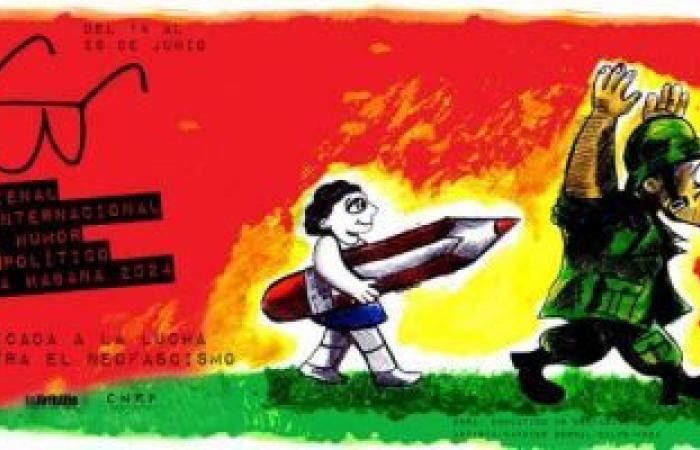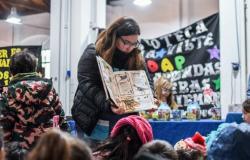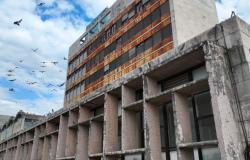Videos: Canal Caribe / Cuban TV and CREART: Ministry of Culture of Cuba.
Political humor is a very serious thing
Yuris Norid
Workers
Of course, humor, as has been said so many times, is a very serious thing, especially when it deals with pressing issues on the public agenda in all its aspects. In the case of politics (which for some is a puzzle and for others a circus… although in reality it must be assumed as an ethical area of conciliation and search for solutions), caricatures and comics can be an effective tool to explain problems and challenges. , to promote awareness and debate… without giving up the recreational vocation.
Iceberg, by Belgian Luc Descheemaeker, Grand Prize of the Biennale
The good exercise of this art must bring together forcefulness and liveliness. And much of that has been seen in the central exhibition of the I Biennial of Political Humor of Havana, which is exhibited in the capital’s gallery 23 and 12.
The Grand Prize winning work —Iceberg, by the Belgian Luc Descheemaeker—could well summarize a substantial essay on the true affiliations of many of the global extreme right groups. And he has achieved it with a clear metaphor, based on a universally shared concept.
At the opening of the Biennial last Friday, the Vice Minister of Culture Lizette Martínez Luzardo stated: “In a world in need of peace and where the rise of the extreme right and neo-fascism is worrying, it is necessary to talk about love, solidarity and social justice. Speeches of hate, denial, and the rewriting of History aim to be naturalized as truths of our people. Faced with this reality, art mobilizes awareness and also becomes a platform for denunciation.”
The Biennial honors the great tradition of political humor in Cuba and proposes a dialogue about its current challenges. Until Friday, June 28, a program will be held that includes conferences, exhibitions, visits to educational centers, theater, film and music presentations.
Biennial of Political Humor begins in Cuba in denunciation of fascism
Al Mayadeen Spanish
The creativity and thematic variety in the proposals of 46 artists from 22 countries stand out.
He Uncle Sam transits towards the abysses. His own followers stalk him and drive him away. In front of them, a multipolar world rises with claws and teeth.
The images described are some of the many caricatures that make up the I International Biennial of Political Humorrecently opened in Havana, Cuba.
When passing through the door of the Cinema of 23 and 12, in the Vedado neighborhood, we became devotees of details.
Very close to each other are the posters critical of the former US president. donald trumprepresentations of missiles falling at the same time storks and of the fight emerging in the midst of evil.
The famous Cuban illustrator Aristides Esteban Hernández Guerrero (Ares), 2020 National Humor Award, highlights the creativity and thematic variety in the proposals of 46 artists from 22 countries.
He insists that the theme is the resurgence of fascism in today’s world, and includes political cartoonists from nations such as Mexico, Venezuela and France.
The island’s vice minister of Culture, Lizette Martínez Luzardo, points out that this meeting seeks to talk about love, peace and social justice in the face of right-wing attempts to rewrite history.
Many of the activities until June 26 include graphic exhibitions, conversations, workshops and screenings of movies in theaters.
Someone points out that this celebration takes permission from the International Graphic Humor event, held in the town of San Antonio de los Baños, and many remember the long betrayal of that festivity since 1979.
Report with the force of humor
From last Friday until next June 28, Havana is the headquarters of the First International Biennial of Political Humor, which has as its theme the fight against neo-fascism.
By: Adalys Pérez
Radio clock
From last Friday until next June 28, Havana is the headquarters of the First International Biennial of Political Humor, which has as its theme the fight against neo-fascism.
Works by 46 artists from 24 countries are exhibited in the competition exhibition, inaugurated in gallery 23 and 12, in Vedado. These were selected among the more than 200 sent in response to the call made by the Ministry of Culture, the National Council of Plastic Arts and the magazine La Jiribilla.
This exhibition shows the different ways in which comedians from different parts of the world condemn the forms of expression adopted by neo-fascism and its impacts on society.
Among the countries most represented in the exhibition competition, whose awards will take place on June 27, are Cuba, France, Iran, Venezuela and Mexico.
All the arts against neofascism
In addition to the competition exhibition in gallery 23 and 12, other exhibitions will be inaugurated at the I International Biennial of Political Humor, which also reflect the fight against neo-fascism or the evolution of political humor in Cuba.
Several capital institutions will host these exhibitions, to which theoretical events, theatrical shows, book presentations, concerts and a film program will be added in four rooms.
There will be no shortage of visits to communities and study centers, most of them pertaining to artistic education. Among the main venues are the National Museum of Fine Arts, the International Press Center, the Casa del Alba Cultural and the Cuba Pavilion.
Neofascism has a skillful adversary in political humor, capable of evading censorship and connecting with the public through its creativity.
1st International Biennial of Political Humor Inaugurated
Dedicated to the fight against neofascism and other contemporary manifestations of that reactionary ideology, the First International Biennial of Political Humor was inaugurated in this capital, which will run until June 28.
The opening, held at the Gallery on 23 and 12, in Vedado, was attended by Alpidio Alonso Grau, Minister of Culture (Mincult), Ricardo Ronquillo Bello, president of the Union of Journalists of Cuba (UPEC), Alexis Triana Hernández, president of the Cuban Institute of Cinematographic Art and Industry (ICAIC), among other authorities and personalities of the medium.
Convened by the Mincult, the National Council of Plastic Arts and La Jiribilla Magazine, more than 40 cartoonists from 22 countries responded to the call by presenting the 79 selected works that will be exhibited in the central exhibition of 23 and 12.
Lizette Martínez Luzardo, Vice Minister of Culture, assured that with this event, Havana, with the permission of San Antonio de los Baños, stands these days as the capital of political humor.
Along these lines, he referred to the need for art to become a platform to talk about love, peace and social justice in the face of neo-fascist attempts to rewrite history and mobilize consciences with it and wield it as a weapon of denunciation.
Cuba will always have space for friends, fair struggles, plurality and everything that opposes the hegemonic power that promotes wars and hatred for economic and strategic interests, he added.
When reading the report of the event, the prominent Cuban caricaturist and illustrator Arístides Esteban Hernández Guerrero (Ares), 2020 National Humor Award, highlighted the creativity and clarity in the works presented from different places around the world when addressing the topic of neo-fascism.
Given the quality and quantity of works to be deliberated, he specified that the jury decided to award three prizes to Cau Gómez, from Brazil, Ouz Gürel, from Türkiye, and Salar Eshatkhah, from Iran.
It was also decided to award the Grand Prize of the International Biennial of Political Humor to the Belgian artist Luc Descheemaeker, in recognition of the excellent workmanship of his work titled Iceberg, and his ability to reflect on neo-fascism in a synthetic and forceful way, he concluded.
The event will offer, among other proposals, graphic exhibitions, theoretical spaces, conversations, audiovisual presentations, concerts and activities in communities and centers of social interest.
Its program will be dedicated mainly to exploring the impact of globalization and the phenomena it implies from the perspective of political humor and denouncing the resurgence of fascism in today’s world.
By: José Manuel Lapeira Casas / Taken from: www.uneac.org.cu







